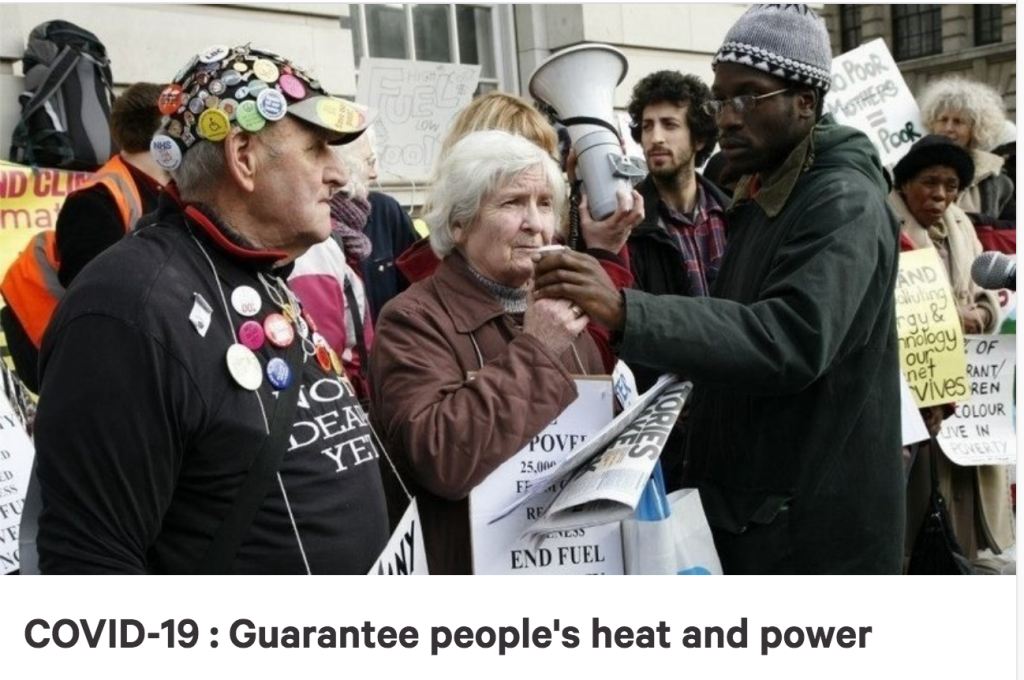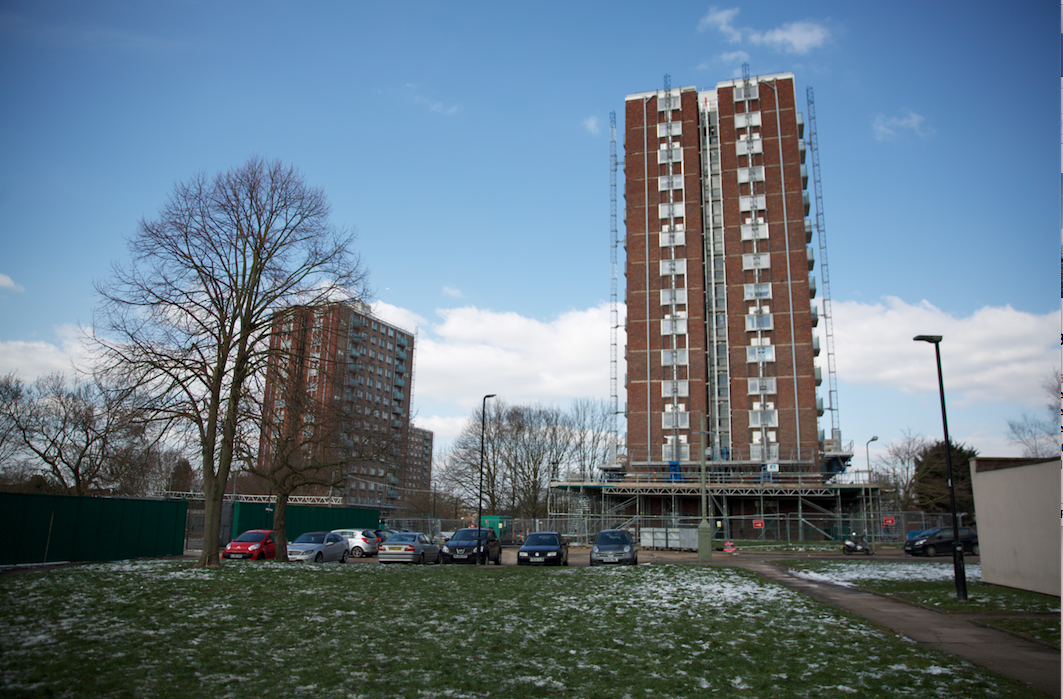You can read our letter to Ofgem below or download it as a PDF file by clicking here.
Letter-to-Ofgem-re-Standing-Charge-from-FPA#EnergyForAll Petition
Diane Skidmore
Sign the petition: https://www.change.org/p/energyforall-everyone-has-a-right-to-the-energy-needed-for-heating-cooking-and-light
UPDATE (October 2022): Latest information backing our Energy For All Campaign.
The petition for Energy For All and its hundreds of thousands of signatures have made waves in the UK, shaking assumptions about what is needed and what is possible. Since we issued the call in February, the background information has changed.
The 54% increase in energy prices came in on 1 April – with an even bigger rise expected in October. Groups and people across the UK mobilizing and pledging to take action in response brought a halt to what could have been the most disastrous energy price rise in our lifetimes.
The Energy Price Guarantee, capped the unit price of energy at twice what it was last winter and was expected to cost up to £150bn in taxpayer’s money to the energy sector – now the new Chancellor, Jeremy Hunt, has stated this will be reviewed in April. Should this cap be lifted, the average household could pay around £4300 a year towards energy bills.
Increasingly, people are recognising that a price freeze or one-off windfall tax does not deliver the security that consumers need. Having seen our petition, a cross-party group of MPs has now opened up discussion within parliament on Energy For All, beginning with an Early Day Motion proposing a ‘Universal basic energy allowance’. You can email your MP asking them to sign!
The need to reverse the huge injustice of energy pricing remains as strong as ever.
The petition has brought this issue onto the agenda. Energy For All, as defined below, is as up-to-date and relevant as ever – a stepping stone away from inequality, and towards a more caring way of life. Join the next stages of the campaign to help make this demand a reality!
#EnergyForAll Petition- Everyone has a right to the energy needed for heating, cooking, and light (original post, February 2022)
Energy bills have risen dramatically in the last year – and the price cap is now to increase by 54% in April. This rise will leave millions of people like me struggling with cold homes. Many of us are facing damp, ill health, darkness, hunger and misery. Before the pandemic and the price increase around 10,000 people died each winter in the UK’s cold homes. Now even more will die.
I’m a pensioner living on a council estate in south London, and even before the recent price increases it was a struggle for me and my neighbours to keep warm. I am asthmatic, and many of us have health problems, as well as problems with our housing conditions. My grandchildren don’t even visit me because my house is too cold. I’ve been working with Fuel Poverty Action for more than ten years now. There are too many people who cannot afford or struggle to keep warm.
To end this outrage, Fuel Poverty Action is calling for #EnergyForAll.
#EnergyForAll means giving everyone a free amount of energy – that is enough energy, free, to cover the basics like heating, cooking, and lighting – to give us all the security we need, taking account of people’s actual needs related to their age, health, and housing. To pay for this new pricing system, Energy for All, we’re urging the Government to introduce a Windfall Tax on the profits of oil and gas producers, traders and suppliers, and to STOP subsidising fossil fuels with millions of pounds every day.
The UK is a wealthy nation, with many billionaires – now more than ever due to fortunes made in the pandemic. Many companies, including energy companies, are clocking up exceptional profits – while we struggle to pay the prices they are charging.
No one should get ill or die because of cold homes. No one should spend days in libraries or shopping centres to keep warm. Every home should be well repaired and insulated so we don’t need so much energy in the first place. We need your help to stop the outrage of fuel poverty – please sign and share this petition!
The government says we will get £200 back – but that will be a loan which we’ll have to repay in future bills. I have no idea where that money will come from in the future. They also say most people will get an extra £150 – very welcome, but far from enough. From April, many will see an increase of around £700 per year – more if your home is poorly insulated, or if you are on a prepayment meter, like many people on low incomes.
Instead of filling the pockets of fossil fuel companies, taxpayers money should be used to make sure everyone can keep warm. And the pricing system should be fair.
At present, we pay more per unit of gas or electricity if we use less of it. At present, we pay a high standing charge even when we use very little energy, or none at all. Our new pricing system, Energy for All, would eliminate that injustice and turn pricing right side up.
Please join my campaign to ensure we get #EnergyForAll.
In April 2022, Diane Skidmore, who started our #EnergyForAll petition, was interviewed by Rob Rinder on Talk TV about rising energy bills, watch below:
Note: “e4a: Energy for All” is a proposal for a new pricing structure for energy, and is entirely distinct from energy4all.co.uk which supports community renewable energy projects. Fuel Poverty Action also strongly supports the aims and cooperative initiatives of Energy4All.
We need a windfall tax on fossil fuel companies profiting from fuel poor consumers
Isabel Davies
The gas crisis is bringing misery and death to people already struggling to survive this winter.
It is the result of the government and Ofgem failing to take basic precautions for when international gas prices rise:
- they allowed gas storage units to close;
- failed to invest in meaningful energy efficiency programs;
- and left privatised retailers to expose consumers to volatile wholesale prices without buying in advance.
We know that UK consumers cannot afford to pay energy companies more money for these mistakes. The money must come from those benefiting from the crisis.
In October we proposed a windfall tax on the profits of fossil fuel extractors. We argued that some part of the $65 billion they made between July and October must not be spent re-investing in fossil fuel exploration, development and extraction, which will further accelerate the climate crisis. Instead, a proportion of the excessive profits must be spent helping consumers keep warm and put food on the table.
Analysts now forecast that the average energy bill will rise almost 50%, to about £1865, this April. National Energy Action estimates this will push another 2 million people into fuel poverty, while of course creating further pain for the 4 million people already unable to pay their bills.
Across the industry, experts such as retail chief executives, former energy ministers and belatedly the labour party are now joining us in calling the government to announce a windfall tax before consumer prices rise in April.
We demand again that the windfall revenues from the international gas crisis are spent on helping people stay warm this winter. To ensure the poorest are reached:
- This should be via a flat payment to each household and not means tested.
- The money should not be spent on funding reduced bills through VAT removal, which would disproportionately benefit the richest consumers.
Plenty of Money: FPA Speech at Winter Deaths Protest – 26 Nov. 2021 – Westminster
So, we’re back here again this year with the NPC to mark the thousands of deaths suffered by people who can’t afford to heat their homes.
This year is worse — because cold damp homes and a rampant respiratory illness do not go well together.
And next year will probably be worse again, because the price of gas has soared and it’s still going up.
The people who pay the highest prices are the ones who have least to begin with, like people on PPMs. That has to change.
Millions of people are rationing every hour of heating.
Pensioners are staying in bed to keep warm, or going to bed early, getting ill from the cold, and in some cases dying lonely, miserable deaths.
This protest is not just to MARK these deaths.
It’s not just an annual ritual to say we won’t forget them. That would be important enough. But this demonstration is more than that. Because these thousands of deaths are totally avoidable.
The government says there is no money to save lives. Yet there is PLENTY of money.
I’m going to take a risk now — because it’s hard to take in any numbers in a speech.
It’s particularly hard when these numbers have loads of zeros on the end.
They count on us to not notice when they give out millions and take away billions — what’s the difference after all? Just some zeros!
But I’m going to take the risk of giving a few examples of where to look for the money we need.
- This spring, the government closed down early the £1.5bn Green Homes Grant scheme, which was supposed to help UK householders insulate our homes. This scheme was so badly designed and managed that it collapsed after just six months. The money has not been replaced. The Treasury still has that money, which could still be used to insulate our homes, keeping us warm, bringing down our bills, and reducing carbon emissions at the same time.
- Because of rising energy prices the UK Treasury could gain an extra £1bn in carbon tax, on top of £4bn they’ve already made this year. Plus another £100 million from VAT receipts due to rising energy prices.
- Oil corporations, internationally, are returning exceptional profits on the spoils of these extra high prices we are paying. On 4 November we wrote to Alok Sharma, the President of COP26, demanding a Windfall Tax on this money — to be used to relieve fuel poverty.
- A wealth tax on the richest 1% of households in Britain – those with fortunes in excess of £3.6m – could create at least an additional £70 billion a year — even with 50% tax avoidance!
It is worth looking closely at that £70 billion.
A few weeks ago, at the COP26 conference in Glasgow, the international deal to mitigate climate change was nearly derailed because all the rich countries together refused to find $100 billion for poorer countries that are ravaged by floods and droughts and wildfires and famines — countries where people have done nothing at all to cause this catastrophe that is now threatening life all over the world.
$100 billion they could not find. Yet £70 billion pounds — £70 BILLION — is about the same as 100 billion dollars. That money could come from a wealth tax on just the richest 1%, in just one small country, the UK.
The world is being driven into a ditch and millions are going cold, or dying of heat stroke, or starving, to save pennies that would not even be noticed by billionaires in their yachts and private planes.
This country, even just the City of London, has plenty of money.
- It is subsidising fossil fuels — those same fossil fuels that were supposed to be so cheap that we couldn’t afford to switch to renewable energy, those same fossil fuels that we now can’t afford.
- It is going on wealthy individuals joyriding into space, even as we are all being told to cut down on carbon emissions.
- Thirty UK millionaires are ASKING for their billions to be used to support people who are struggling to survive. They have told the chancellor, “We know where you can find that money – tax wealth holders like us.”
And at the same time, Universal Credit is cut,
Disability benefits never got the uplift in the first place,
take home pay is hit by the NI tax,
and the government has “suspended” the pensions Triple Lock.
And our precious health service, that our lives depend on, is being sold off, dismantled, and starved of funds.
Medical and care staff are leaving in droves because pay and conditions are so bad.
Within a few miles of the obscene wealth of private individuals who have profited from contracts and price hikes during the pandemic, are millions of UK families and pensioners going to bed hungry or shivering in the cold.
Families are rationing gas, electricity, and heating, sometimes to an hour or less a day. Children are unable to study, or play. Parents don’t know how they will get through the winter.
Almost every health condition is exacerbated by cold. And people who are old, disabled, homeless, hungry, or suffering from a long term illness, are at risk of death.
Deaths from fuel poverty in this wealthy country are not inevitable. They are an obscenity.
They’re a result of deliberate policies on housing, fossil fuels, pensions, benefits, taxes, and wages.
This cannot be allowed to stand.
Ruth London, Fuel Poverty Action, 26 November 2021
Links:
https://www.nea.org.uk/news/call-for-energy-tax-windfall-to-help-poorer-uk-households/
https://www.nea.org.uk/news/call-for-energy-tax-windfall-to-help-poorer-uk-households/
https://gala.gre.ac.uk/id/eprint/33819/https://united-society365.uk/13897/we-can-afford-to-contribute-more-uk-millionaires-call-on-chancellor-to-introduce-wealth-tax/
Winter Deaths Protest!
Join Fuel Poverty Action and National Pensioners Convention: 26 November 12pm, George V’s statue, Old Palace Yard Westminster
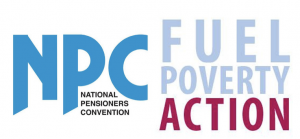
As always at this time of year, FPA will be joining with pensioners’ organisations to mark the release of statistics on “excess winter deaths”. Each year in the UK around 10,000 people die because they cannot afford to heat their homes. That figure is from before the pandemic and it’s likely to be still higher now: Covid and cold homes do not go well together. FPA will join with the National Pensioners Convention and speak at the event on 26 November to mark these tragic, desperate, and avoidable deaths.
We will demand action. There is no shortage of money to help us keep warm:
- Oil corporations, internationally, are returning exceptional profits on the spoils of the extra high prices we are paying. During COP26 FPA wrote to its President, Alok Sharma, demanding a windfall tax on this money — to be used to relieve fuel poverty.
- The UK Treasury could harvest as much as £100 million from VAT receipts on rising energy prices. Its ‘Carbon tax’ revenues could rise by £1bn in revenue to the Treasury, on top of £4bn already made this year.
- This spring, the government closed down early the £1.5bn Green Homes Grant scheme, which was supposed to help UK householders insulate our homes. But the National Audit Office found it was “botched” and collapsed after just six months. The money has not been replaced.
- 30 UK millionaires are asking for their billions to be used to support people who are struggling to survive. They have told the chancellor, “We know where you can find that money – tax wealth holders like us.”
- A wealth tax on the richest 1% of households in Britain – those with fortunes in the excess of £3.6m – could create at least an additional £70 billion a year — a huge sum, around the same as the US$100 bn a year that all the rich nations together claimed they couldn’t find to support frontline countries to adapt to climate change!
Within a few miles of the obscene wealth of private individuals who have profited from contracts and price hikes during the pandemic, are millions of UK families and pensioners going to bed hungry or shivering in the cold. Families are rationing gas, electricity, and heating, sometimes to an hour or less a day. Children are unable to study, or play. Parents don’t know how they will get through the winter. Almost every health condition is exacerbated by cold. And people who are old, disabled, homeless, or suffering from a long term illness, are at risk of death.
Deaths from fuel poverty in this wealthy country are an obscenity. They’re a result of deliberate policies on housing, fossil fuels, pensions, benefits, taxes, and wages. This cannot be allowed to stand.
JOIN THE PROTEST
Friday 26 November 2021, Midday. Please bring banners and publicise the event so that we have a good attendance. If you can help with a portable sound system, please let us know!
Assemble by George V’s statue at Old Palace Yard Westminster opposite the House of Lords. Then march to 10 Downing Street where a letter will be handed in.
Speakers include TUC President Sue Ferns, Lord Prem Sikka, and Ruth London from Fuel Poverty Action.
To contact NPC please use 020 8668 2840 / [email protected]
Adding insult to injury in Salford: with rents and service charges set to rise, 127 Pendleton Together residents sign up to litigation
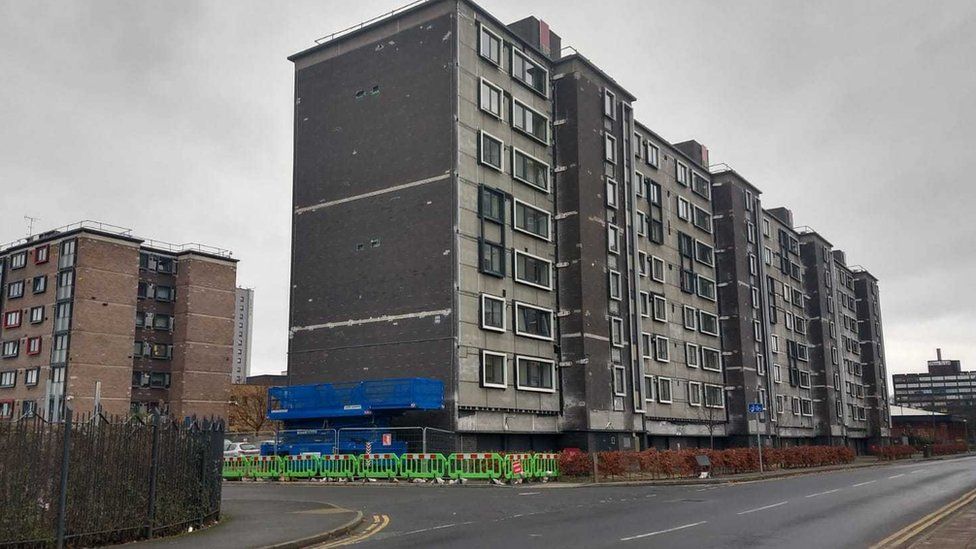
For several years FPA has been supporting residents of nine tower blocks, run by Pendleton Together on behalf of Salford Council, and several tenants took part in our December conference, Making Green Come True. The blocks all had cladding identical to Grenfell Tower’s, and many other similar dangers. This autumn, after years of tenants enduring life in a tinderbox, the cladding was finally removed – in time to leave them without insulation in a freezing winter, in the middle of a pandemic. To make matters worse, many of the flats are heated by NIBE heat pumps which are simply too expensive to run.
The tenants’ determined battles against impossible living conditions, neglect and intimidation are regularly chronicled in the Salford Star, see for example Salford NIBE fuel poverty scandal hots up in Pendleton (9 July 2015 (sic)) Salford cladding issues won’t be sorted until 2022 as solicitors move in (25 Nov 2020), Freezing salford tenants stuck in Pendleton blocks (12 Jan 2021), and most recently, Salford City Council set to approve increases for freezing tenants (2 February 2021).
Now the tenants have banded together to take their landlords to court, and Rowan Rose solicitors have been gathering the bountiful evidence of illegality. Graeme Langton, tenant in one of the Pendleton Together tower blocks and an FPA member writes:
Adding Insult to Injury
127 Tenants living in the 9 tower blocks in Salford affected by dangerous cladding, faulty windows, NIBE heating systems that are too expensive to run, fire doors unfit for use, etc., have signed up to litigation action against Salford City Council and their housing managers Pendleton Together. They claim that their properties are unfit for human habitation.
Now Salford City Council, at a meeting next week, are set to approve rent increases for all properties of 1.5% (Consumer Price Index + 1%). Not only have tenants’ debts increased due to spiralling heating costs, but their anxiety and mental health issues have increased, living in fear of their surroundings.
Yet public records show that the Chief Executive for Salford City Council pocketed a total package of £243,707 during the financial year 2018/19 compared to £198,290 the previous year. A whopping rise of over £45,000. Add this to the many Section 106 payments and planning fees waived by the council, together with no affordable housing provision and the £25,000 a week spent on Fire Marshalls, these rent and service charge increases only add insult to injury.
The Coronavirus fuel poverty crisis won’t be solved without government support
As the Covid 19 crisis unfolds, we are, as anticipated, hearing far too much about people forced into acute fuel poverty through self-isolation and/or loss of income. Gig economy workers have found themselves unable to access government support. The government furlough scheme is kicking in too slowly to help people get their bills paid now, and for those on low incomes 80% of usual earnings won’t stretch far enough. People who can usually afford to cover their needs are finding themselves choosing between adequate food and adequate heat and power. Both are crucial for health. As the weather improves, there are still cold nights and days, extra needs for power for people home all day, money still owed from the spring and winter, and crushing anxiety about the year ahead.
The government made an agreement with suppliers to suspend disconnections and to support customers at risk. In practice, it isn’t working. What we are hearing is that companies generally won’t, or can’t, reduce bills – most will at best offer deferrals which for some just means the frightening reality of unpayable debts for the future.
Graeme Langton, from Salford says,
Help should be automatic if you’re on a low income, then you might say, ok, I can have it on for that extra hour. It’s no good if you have to wait till you can produce the bill and apply. You ask yourself, will I put the heating on in the hope that the government will give a bit back? What if they say no? If you get in debt, you could lose your home. And there’ll be interest on it, and 200% for overdrafts. Supermarkets have put prices up. There’s no more 2 for 1 offers, instead the food prices have gone sky high. It’s either eat or keep warm.
In addition, there is a risk of some small companies going bankrupt, without a workable rescue plan for their customers.
To help those in crisis now, the government needs to set up an energy relief fund. This has been advocated by the People’s Energy company, an independent energy supplier that provides 100% renewable power and has pledged to give 75% of profits back to its customer-members through an annual rebate. We are convinced too that vital immediate needs will not be met without this sort of intervention. Government support would transform the implementation of the agreement reached with the energy industry, in line with our own petition.
Strings should be attached. For some energy companies, large and small, such support for customers who cannot pay their bills could be critical to their survival as well as that of their customers. We cannot forget that some of these firms have been responsible for many deaths from fuel poverty, forceful imposition of unwanted prepayment meters, a failure to prioritize energy efficient homes, and promoting fossil fuels over renewable sources of energy. As this current crisis continues and with time, recedes, it is crucial to ensure that that model of supply does not continue to cause death and suffering. If companies are going to benefit from this scheme, they should be required to commit to changes which will benefit their most vulnerable customers now and in the future.
These should include:
Thorough adherence to the terms of the agreement, to include short response times to customers in trouble, and a readiness to write off debts where paying them would leave people unable to meet basic needs for energy, rent and food.
Immediate free credit to users of prepayment meters so they are not cut off while they are trying to negotiate with suppliers. This should not be refundable — no storing up debt for the future. And standing charges should be waived — they disproportionately hit people who have cut their usage to a bare minimum, but cannot access any power till they’ve covered the standing charge.
Ambitious insulation programmes — installing safe and appropriate insulation is the best way of bringing down bills. Government programmes were slashed eight years ago, and responsibility for this vital work passed to suppliers. Home insulation installations plummeted by 95% between 2012 and last year.
As is commonplace in Europe, companies being supported by government bail-outs should not be paying dividends to shareholders or huge salaries and bonuses to executives. While some energy suppliers are in financial trouble, we are coming to the easiest part of the year for them, and they are benefiting from the fact that wholesale prices of gas and oil have fallen like a stone, which has not been reflected in the price cap. Support for desperate customers must not end up as a windfall for people in no need at all.
Other companies might take a leaf out of People’s Energy’s book on customer service and response to the crisis so many people face. Their customers can expect to get through to them in 18 seconds. The emergency fund they have set up themselves raised £27k within the first day, and is helping them to start addressing customers’ needs.
But the reality is that the scale of the crisis means that government support is needed, and needed now.
New petition on COVID-19 – please sign!
Keeping the heat and lights on is a major worry now for people who may be home all the time and may have lost income. The government and suppliers have agreed some help. You should not be disconnected — and there are also protections for people on prepayment meters.
- If you can’t get out to top up, or your emergency credit has run out CONTACT your energy supplier for help NOW. You can find their contact details online or on your bill.
- Your supplier can add credit to your account or sending you a pre-loaded card or key.
However, FPA are concerned that the agreement will still leave many people in the dark and cold (for the exact provisions see here and a summary at the bottom of the petition, below. So we’ve started a petition! Please SIGN and help circulate it as widely as you can.
The agreement between the government and the energy suppliers say that people struggling to top up prepayment key or card meters will be able to contact their suppliers to discuss ‘having a discretionary fund added to their credit, or being sent a pre-loaded top up card so that their supply is not interrupted.’ Others having difficulties with energy costs should also be supported by measures ‘which could include debt repayments and bill payments being reassessed, reduced or paused where necessary’.
Still in Danger One Year On
Before the government conceded the principle by promising to “fully fund” the replacement of Grenfell-style cladding, FPA had collected over 60 signatures from MPs, community organisers, campaigners, trade unions, and resident associations on an open letter that demanded that the government release the money to make people safe and warm. Though the victory in £400 million cannot be understated, the money and promises don’t nearly go far enough in ensuring peoples’ homes are made safe from fire, nor does it promise vital guarantees to keep people warm over the winter when remediation works are underway and cladding and insulation is off. FPA spoke to many people left out in the cold and suffering in freezing homes last winter, whilst their insulation was off. Cold, like fire, kills.
FPA have redrafted their letter and sent it out to be signed. The new letter presses on a set of urgent demands that the government needs to meet and will be delivered to the Secretary for Housing, Communities and Local Government this October.
Please read and share.
Solidarity.
.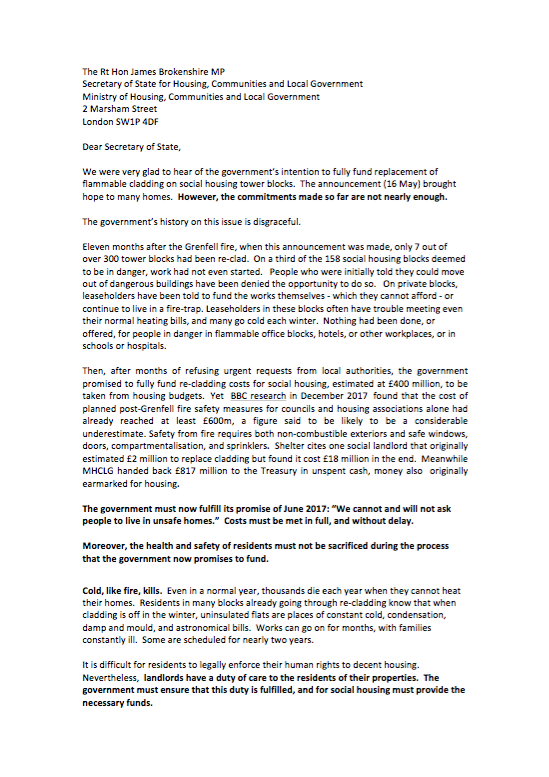
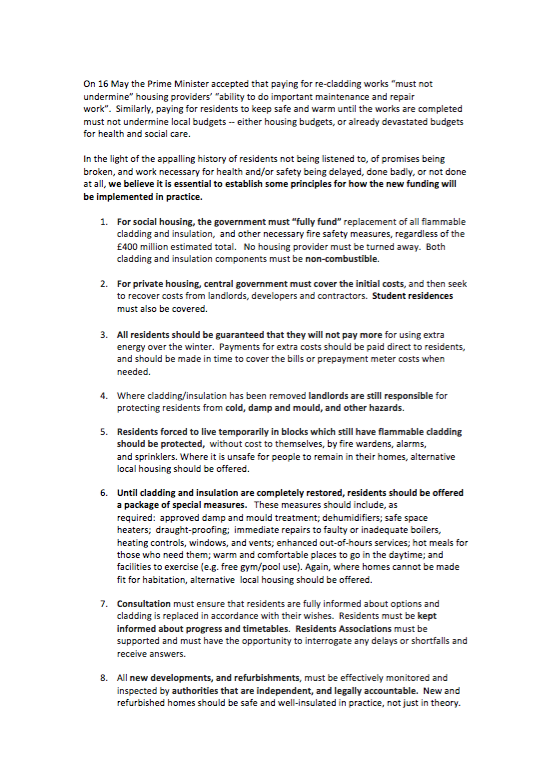

Still Not Safe — news from a Salford tower block
On the anniversary of Grenfell, I have been asked to write this blog post describing what its like living in a high-rise building with dangerous cladding on it like Grenfell had. My name is Elizabeth and I live in a 22 story high rise housing association block in Salford, managed by Pendleton Together and owned by Salford council.
The block has flammable cladding. And a year on from the tragedy it still has the cladding on it except for the first three floors. And it’s been terrible living here since the tragic events for several reasons. Since the Grenfell fire me and several residents haven’t been able to sleep well and have been too scared to sleep, especially in the first few weeks. We were first promised that if anyone wanted to move they should just go to the Housing Association and they would look at our cases fairly. But unfortunately many residents, even the ones with kids on high floors and people with health problems and people with doctors letters recommending they are moved, have been denied a move. This has upset residents a lot since many kids and people with health problems died in Grenfell .
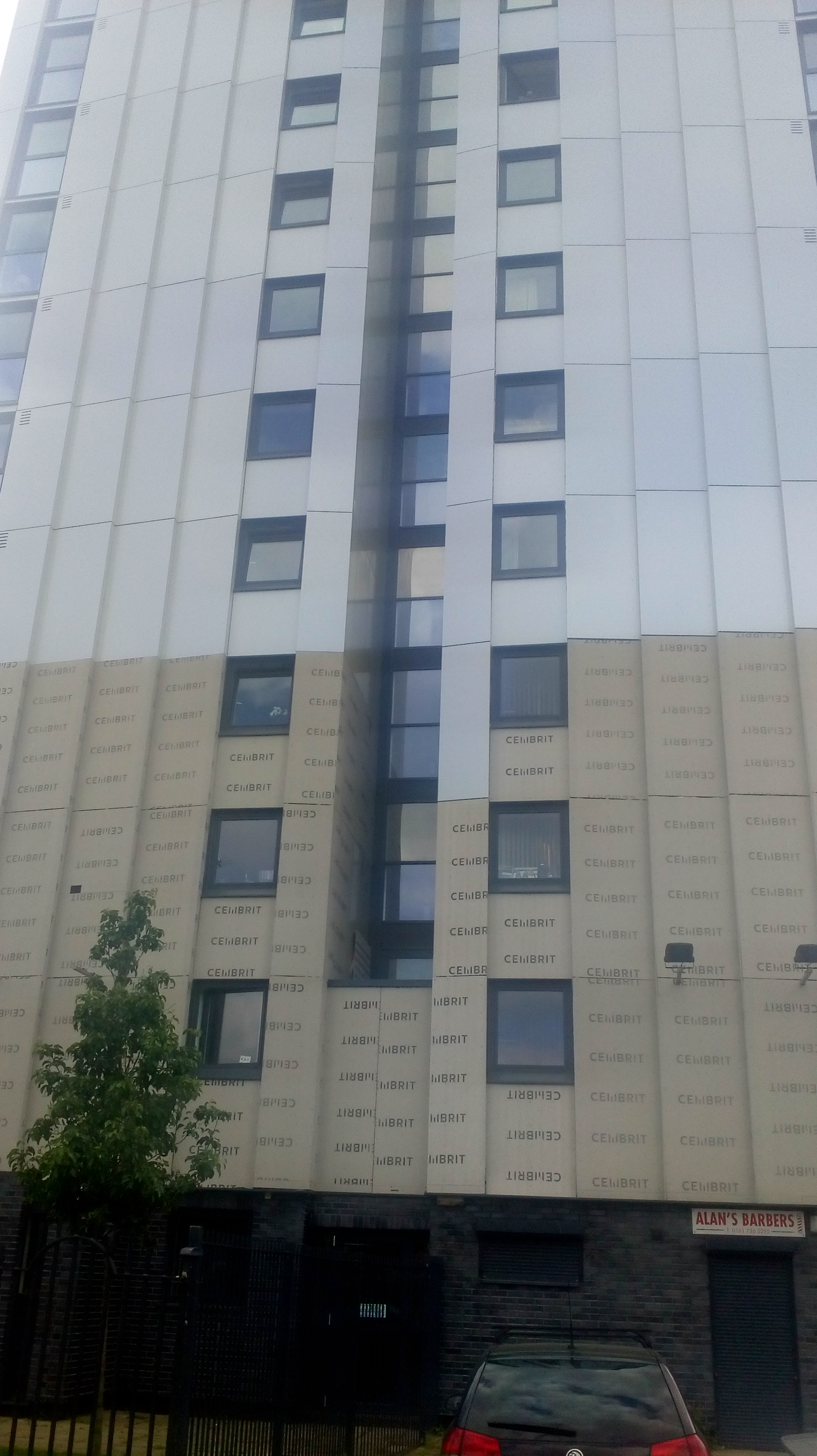
We have been told that removing the cladding is going to take two years and that they’re looking at installing sprinklers in the all the high rise blocks. A month after the Grenfell fire the mayor of Salford, Paul Dennett , said he would remove the cladding and that he wouldn’t wait for the report from the national and local government on testing whether the cladding that’s on our blocks is flammable like Grenfell. And that he would borrow £25 million pounds to get the cladding off and keep residents safe. Unfortunately, Pendleton Together only removed the first three rows, and a year later my block and many other blocks managed by Pendleton Together still have the major part of the cladding still on. Cladding only came off for the camera news crews and work stopped when the camera and TV news crews stopped filming.
There was a meeting I attended about a month after the Grenfell tragedy, which was held in Salford youth theatre, where the deputy mayor and other various speakers came to talk about Grenfell. When the meeting got heated the deputy mayor of Salford said we should be thankful he came, as he didn’t have to come to the meeting to let local residents know what the Salford Council was going to do about our unsafe home. He stated that the Salford council only had £25 million in its reserves, unlike Kensington and Chelsea, the council that the Grenfell Tower falls under.
In my block there is an internal fire alarm. When it goes off it only rings in the two exit stairwells which are located at both ends of the building, not the hallway, not the flats as it’s not connected to ring all the fire alarms to alert residents there is a fire in the building and to evacuate. The fire alarm is so quiet because the sound is coming from the stairwell. When it goes off, many residents don’t hear it. I and others have complained about that but nothing has been done.
We have had four fire alarms where residents had been told to evacuate the building and many residents were still inside with their kids and said they didn’t hear it. That’s no surprise since nobody lives in the stairwell. I slept through one fire alarm as I couldn’t hear it as I was sleeping and it’s too quiet. If you have the TV or music on you might not hear it, or if you’re sleeping.
Secondly we have no fire blankets or small fire extinguishers to put out small fires, like many flats have for safety.
Thirdly we have no Tenants Association due to the fact the housing association locked us out of the community room and said not enough people attend the meeting. We usually have between 5 and 10 people at our tenants meeting, but they said it’s not enough. So we can’t make an official complaint as the Tenants Association meeting as we aren’t official. It’s been like that for two years now. Our community room has never been open to the tenants officially, it’s been used by the cleaners and by other blocks for their meetings, which is very unfair.
If one tenant types a letter expressing the complaints of several tenants, the Housing Association will target the person whose address is on the letter and say that they’re the only one complaining. We have to put a resident’s address on the letters as a reply address, as the community room doesn’t have an address or letterbox, that was binned after the refurbishment
We were promised raised beds to grow vegetables and fruit since many residents are on low incomes. We were hoping to donate the vegetables and fruit to the food bank but that never materialized even though it was on the plans of the refurbishment of the block.
We also have very expensive heating system called the NIBE system , that many residents can’t afford and that other housing associations have had to rip out due to expensive bills that it causes for residents. Residents have complained about the NIBE but the Housing Association has just blamed the residents and said they haven’t use the NIBE properly.
The major refurbishment of our block included an electricity installation, and it’s caused many power surges that have tripped the electricity in my flat and others’ flats. My cooker which was only a year and half old tripped my electricity and cut all my electricity off in my flat due to a power surge. I called out the housing association, they sent an electrician who said it was my cooker. I then called the manufacturer who tested my cooker and said there was nothing wrong with it. My friend who lives in another flat also had problems with her cooker ever since the electricity refit. Her cooker is not working properly. We have never been offered any compensation and being unemployed I had to pay the bill just for the manufacturer to tell me there nothing wrong with my cooker.
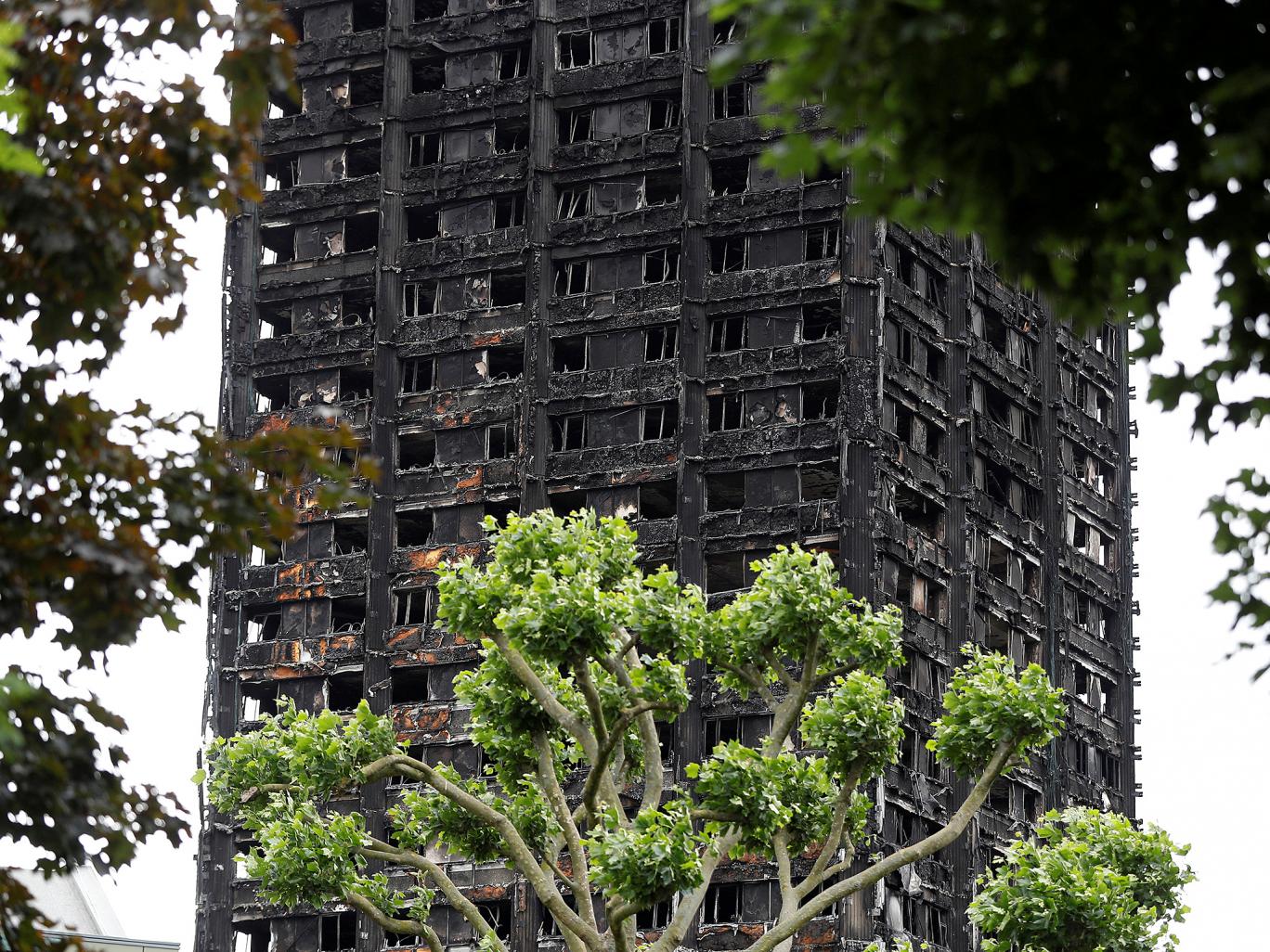
Grenfell residents and their blog was complaining about the power surge since their refurbishment. It’s really worrying that we having the same problem. As it’s strange for a fridge freezer to catch fire. Rumours are that it’s the electricity surges and the upgrade of the block that made the fridge catch fire. I can’t know for sure but I don’t believe that fridges randomly catch on fire .
After Grenfell I don’t trust the Tory Government , my local council or the Housing Association. It’s disgusting that a year after Grenfell many residents haven’t been rehoused. And that residents who live in high rises like Grenfell with this cladding are being ignored. Its stinks of class warfare to me. Our lives don’t matter in these austerity times.
The housing association lastly have put fire marshalls who are meant to walk the floors 24 hours a day, but many residents have complained that they are always downstairs on the ground floor and never seen walking the floors. If the fire alarm goes off they are meant to run up stairwells , go on each floor and alert residents to evacuate the building, but in practice they only seem to be on the second floor or on the ground floor when the fire alarm has sounded, which has made many residents feel unhappy and unsafe.
These are the reasons why many residents are unhappy living in these high rises, because their problems aren’t being addressed and they are being denied a move to safe accommodation.
You can join the ‘Safe Cladding and Insulation Now’ facebook group to share your story and hear from others here.
Full details of the Fuel Poverty action ‘Safe Cladding and Insulation Now’ campaign can be found in the Cladding & Insulation sections of our website.


